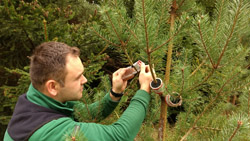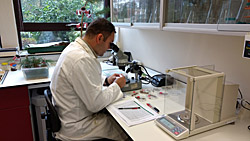Summary
Summary
Targeting Neuropeptide Hormones to Control Forest Pest Damage.
The Neurostresspep project was an international collaboration to identify and explore the effects of naturally occurring insect neurohormones for the control of damaging pest insects, whilst preserving beneficial insect species. As part of this project, Forest Research worked on an important forestry pest, the pine weevil (Hylobius abietis), to test whether the damage it typically does could be reduced using neuropeptide hormones, without the need for traditional chemical control.
Background
As insecticide resistance becomes more widespread in pest insects, and legislation limits their use due to undesirable side effects, so new and ‘greener’ control agents are needed against pests of agriculture, horticulture and forestry. Our novel area of research aimed to exploit the selective nature of neuropeptide signalling hormones for combating pest species, whilst remaining harmless to non-target insects. Neuropeptides are produced by the nervous system, and regulate all critical processes in insects, including behaviour, reproduction, water balance and energy metabolism. Neuropeptides specific to pest insects, and not found in beneficial species, have great potential as targets in an integrated pest management context.
 The pine weevil Hylobius abietis is a major pest of plantation forestry throughout Europe. Larvae develop in the bark of conifer root stumps in recent clearfells, and adults emerge to feed on the bark of replanted seedlings, which are frequently girdled and killed. As mortality of seedlings can be very high, the new trees are often chemically protected to allow them to establish. Since insecticides may present potential environmental side effects and operator risks, minimising their use is clearly desirable.
The pine weevil Hylobius abietis is a major pest of plantation forestry throughout Europe. Larvae develop in the bark of conifer root stumps in recent clearfells, and adults emerge to feed on the bark of replanted seedlings, which are frequently girdled and killed. As mortality of seedlings can be very high, the new trees are often chemically protected to allow them to establish. Since insecticides may present potential environmental side effects and operator risks, minimising their use is clearly desirable.
Research objectives
- To contribute to the development of neuropeptide analogues (synthetic copies), by testing their effect on the physiology of pine weevils in the laboratory.
- To conduct field-realistic trials exploring the potential of neuropeptides in reducing pest damage in a forest environment.
- To advise on the development and potential application of neuropeptide products in a forest pest management context.
Status
The Neurostresspep project was funded for 4 years from June 2015 – May 2019. During this time we researched the influence of a range of neuropeptide compounds on the physiology of pine weevil, and assessed how this might influence the severity of damage the weevils do to young replanted trees.
Related Products/Services
Hylobius management support system
Integrated forest management of Hylobius abietis
Contact
Funders and partners
The project involved 14 international partners with a broad range of expertise, from the lab to the field.
This project was primarily funded by the European Union under the Horizon 2020 programme, with additional support from the Forestry Commission under the ‘Advice and scientific support for tree health’ programme.
Forestry Commission policy
To develop sustainable pest management strategies with the particular aim of reducing insecticides (UK Woodland Assurance Standard – UKWAS).

